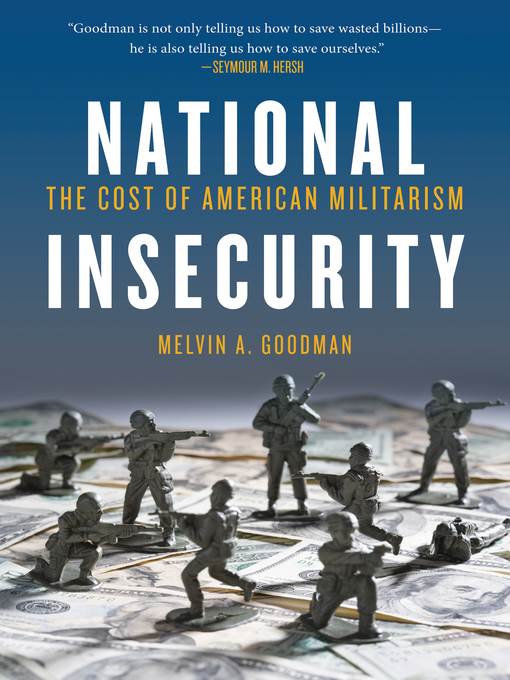
National Insecurity
The Cost of American Militarism
کتاب های مرتبط
- اطلاعات
- نقد و بررسی
- دیدگاه کاربران
نقد و بررسی

November 12, 2012
In this impassioned exposé of the astronomical costs of America’s defense policy, former CIA analyst Goodman (Failure of Intelligence: The Decline and Fall of the CIA) demonstrates how post–cold war neoconservatives, energized by the recent dissolution of the U.S.S.R. and the United States’ unrivaled position as the world’s premier superpower, promoted a pugnacious militarism that has led to a string of foreign policy debacles and unprecedented levels of military spending. Kicked into high gear by Reagan, expenditures slowed during the 1990s under Bush and Clinton, but skyrocketed after the 9/11 attacks and during the second Bush’s “ultra-expensive and un-winnable wars.” Obama, having inherited “a national security state that violate civil rights at home and human rights abroad,” promised reforms, but has been reluctant (or unable) to actively reduce military expenditures. The military-industrial complex, presciently denounced decades earlier by Eisenhower, rumbles on. The obligatory how-to-fix-it chapter contains much bipartisan, cost-cutting rhetoric, but it’s clear that the majority of both parties in Congress consider the defense budget sacrosanct, or at least immutable. Few will finish this precisely argued polemic without the uneasy feeling that military spending is out of control.

December 15, 2012
A 25-year CIA veteran examines how recent presidents have handled the military and defense spending. As he left office in 1961, President Dwight Eisenhower gave a farewell address in which he warned against the influence of the "military-industrial complex," theorizing that overinvestment in defense could compromise other domestic issues. Goodman (Failure of Intelligence: The Decline and Fall of the CIA, 2008, etc.) claims that in the 50 years since that speech, Eisenhower's warning has gone unheeded, especially by the four most recent presidents: George H.W. Bush, Bill Clinton, George W. Bush and Barack Obama. The author takes each president to task for his particular failings in foreign policy or his dealings with the military. While the chapter on the second Bush administration and its manipulation of post-9/11 intelligence reports feels slightly rehashed, the chapters on George H.W. Bush (covering the invasion of Panama and Desert Storm and Desert Shield) and Bill Clinton (which addresses "don't ask; don't tell," as well as military incursions into Haiti, the Balkans, Somalia and Rwanda) are engrossing and thoughtful. After examining these four presidents, Goodman includes a chapter on the national missile-defense program, calling it "the most expensive and least effective weapons system in the U.S. arsenal." This program was introduced during the Ronald Reagan administration (which spent more than $60 billion to develop it), leaving readers to speculate why Reagan was not included as a president guilty of runaway military spending. Goodman waits until nearly the last page before offering "some good news in the overall picture." He offers a few words of praise for President Obama, who "does understand that the United States is far less exceptional than his opponents believe," before ending with an ominous reminder: "The age of the superpower is over." Engaging reading for those interested in foreign policy and military spending.
COPYRIGHT(2012) Kirkus Reviews, ALL RIGHTS RESERVED.

























دیدگاه کاربران